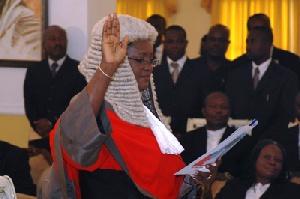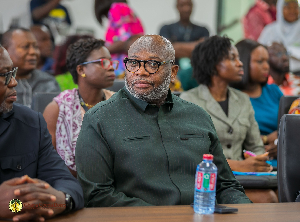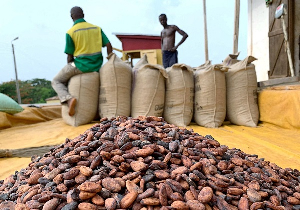Kofi Akosah-Sarpong argues that the only way to signal a new dawn in Ghana’s juducial service is for Ghana’s new Chief Justice, Justice Georgina Wood, to play decisively with Ghanaian customary laws and the orthodox neoliberal ones in the larger progress of Ghana.
Ghana’s new Chief Justice, Georgina Wood’s confirmation by the Parliament of Ghana was a first for a woman in Ghanaian legal history. It indicates the increasing attempts to free Ghanaian women from the long-running clutches of traditional patriarchy, which pretty much run through the values of the 56 ethnic groups that make up the Ghana nation-state. It also attempts to bring into national level the need to raise the confidence level of the long-suppressed Ghanaian norms, values and traditions in the country’s progress. The suppression of Ghanaian women, in terms of decision-making and appointments, had been double: the Western development paradigms that created the Ghana nation-state are heavily patriarchic. Most of the 56 ethnic groups that make-up Ghana, too, values are patriarchic. Until recent remarkable efforts by ex-Ghana First Lady, Nana Konadu Agyeman Rawlings, there had not been fuller attempts to free Ghanaian women from patriarchy, which had impacted negatively on Ghana’s progress. This is despite the fact that Ghanaian women are the bedrock of the country’s progress. Not only did the appointment of Justice Wood comes on the tail of the criminalization of Female Genital Mutilation by the Parliament of Ghana but earlier the same legislature had criminalized “trokosy,” a cultural practice among the Ewe group in West Africa – Ghana, Togo and Benin Republic – where teenage girls are enslaved to shrines for sins committed by their parents. The key fertilizer for criminalizing these ancient cultural practices is democracy and its element of human rights. Not only has democracy helped Justice Wood to become the First Chief Justice of Ghana but also the emerging African Renaissance, which is increasingly awakening African values for progress, after the extremely long-running colonial rule suppressed indigenous African values to the detriment of their growth.
It is against this background that Justice Wood is to play with the norms, values and traditions of Ghana in the context of the current neo-liberal legal structures that run Ghana. Justice Wood is expected to be a legal magician: juggling simultaneously the elements of indigenous Ghanaian customary values with the orthodox neo-liberal legal systems. In the process, Justice Wood is expected to become some sort of a legal alchemist, mixing both the Ghanaian customary laws with the orthodox neo-liberal legal ones. Justice Wood has draw from her famed credibility, carefulness, considerations, objectivity and rigorous analyses in her 33 years of judicial experiences, especially her experiences in Alternative Dispute Resolution Mechanism.
The on-going parliamentary activities to refine some of the inhibitions within the Ghanaian culture give Justice Wood a secured platform. Before her appointment there have been efforts to raise as much as possible indigenous Ghanaian customary laws to national level and accorded it the long denied respect and confidence it deserve. The late Chief Justice, George Kingsley Acquah, had carried out innovative attempts to reconcile the Ghana Judicial Service with the customary “adjudication capacity of chiefs with the administration of justice at the community.” As the most laws which most Ghanaians access, Justice Wood’s attempts to play with Ghanaian traditional laws with the orthodox ones will help in the deeper progress of Ghana. The international community, as part of the broader international development process, is attuned to raising customary laws in the broader development. From Botswana to Canada to Southeast Asia, from the World Bank to the European Union, this is happening. GTZ, Germany’s key international development agency, had earlier funded the Ghana Judiciary Services reforms that aim to bring traditional legal values on board the mainstream ones in Ghanaian rural communities, where most Ghanaians live and where people understand their traditional customary laws better, because it emanates from within their values, than the Western laws.
Justice Wood can play with the fact that Justice Acquah’s attempts to “reconcile traditional and modern jurisprudence in the overall administration of justice in the country,” in consultation with the National House of Chiefs (NHC), key carriers of Ghanaian values, was to offer traditional rulers, for long marginalized in Ghana’s development process, the break to “share their vision and ideas” in the incorporation of traditional legal values in the mainstream judicial services. In the deeper development process, as Justice Acquah envisioned, “chieftaincy was a potent traditional institution that could play a major role in the peace and development of the nation.”
As attempts are being made to open up the Ghanaian culture, tout the enabling parts, refine the inhibiting aspects, integrate and mix them for the larger progress of Ghana, the Ghanaian chieftaincy institution, as Justice Acquah argued, “was now confronted by growing political and social consciousness…It was time to bring the institution in line with the modern norms and practices of the judicial system, which was meaningful, effective and relevant to modern day judicial administration.” Justice Wood is expected to use as her legal playground: drawing from her vast experiences, her immense education and thoughts, her remarkable global exposure, her authentic Ghanaian norms, values and traditions in the broader processes of the global development process in Ghana’s progress.
















